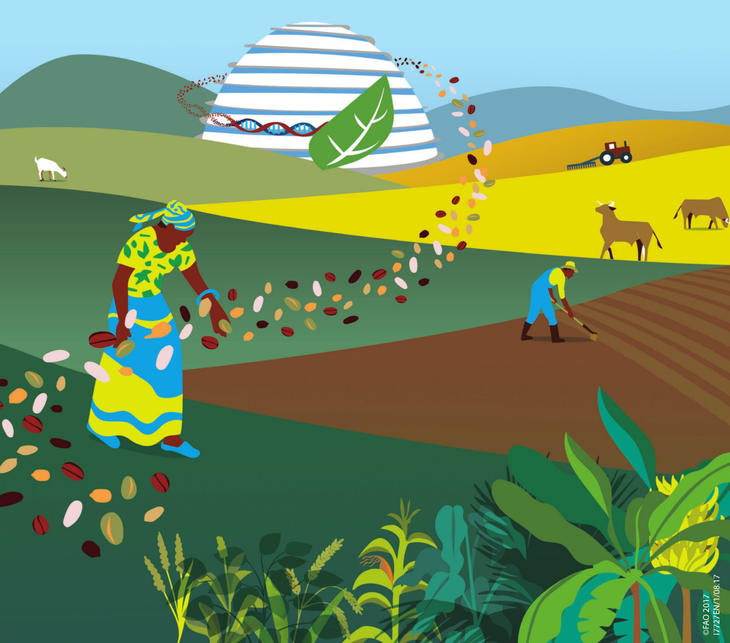
Seventh Session of the Plant Treaty’s Governing Body, Rwanda, 2017
A breakthrough for Farmers’ Rights was achieved at the Seventh Session of the Governing Body of the Plant Treaty, held in Kigali, Rwanda, from 30 October to 3 November 2017. After 10 years of negotiations, a consensus was finally found to establish an Ad Hoc Technical Expert Group on the realization of Farmers’ Rights.
The Ad Hoc Technical Expert Group (AHTEG) was established to develop an inventory on the experiences with implementing Farmers’ Rights across the world and to derive a set of options for the realisation of Farmers’ Rights from these experiences. Both would be presented to the Plant Treaty’s Governing Body for its consideration. Developing countries had been demanding the development of voluntary guidelines for the implementation of Farmers’ Rights for the past ten years, without success, and even if options are not as prescriptive as voluntary guidelines, the decision was seen as a major advance for Farmers’ Rights.
An important background for this achievement was the Global Consultation on Farmers’ Rights that had been held in Indonesia in 2016. Bringing together stakeholders from all regions, the consultation had discussed why Farmers’ Rights matter, shared experiences regarding the realisation of these rights and addressed the major challenges before discussing possible ways forwards, as compiled in the proceedings from the consultation. A co-chairs summary of recommendations from the Global Consultation was presented to the Governing Body at its Seventh Session in Rwanda by Indonesia, on behalf of Norway and Indonesia, the two countries that had organized the Global Consultation together with the Secretariat of the Plant Treaty. The results of the Bali Global Consultation on Farmers’ Rights were also presented at a side event during the session.
Following the presentation of the Global Consultation on Farmers’ Rights, a contact group was established by the Governing Body to discuss the contents of a resolution text on Farmers’ Rights and the terms of reference for a possible group, to be adopted by the Governing Body at this session. The contact group was led by Godfrey Mwila from Zambia and Regine Andersen from Norway. After much deliberation, the contact group Co-Chair from Norway could report to the Governing Body that an agreement to establish an Ad Hoc Technical Expert Group on Farmers’ Rights had been achieved.
The resolution on Farmers’ Rights that was adopted at this Seventh Session, Resolution 7/2017, included the terms of reference for the Ad Hoc Technical Expert Group on Farmers’ Rights, i.e. to:
- produce an inventory of national measures that may be adopted, best practices, and lessons learned;
- develop options for encouraging, guiding and promoting the realization of farmers’ rights.
The group should comprise up to five members designated from each region, up to three representatives of farmers’ organizations, and up to three other stakeholders, including the seed sector; and report back to the Governing Body at its Eight Session.
Furthermore, the resolution adopted at this session also invited Contracting Parties and relevant organizations to take initiatives to convene further regional workshops and other consultations with a broad range of stakeholders, including with farmers’ organizations, for the exchange of knowledge, views and experiences on the realization of Farmers’ Rights and to present the results at the Eighth Session of the Governing Body. The Secretary was requested to facilitate such initiatives upon request, subject to the availability of financial resources.
In addition, the Secretary was requested, according to the availability of financial resources, to continue the process of identifying possible areas of interrelations between the International Treaty, in particular its Article 9, and the UPOV Convention as well as to explore the possibility of carrying out a similar process with the relevant instruments of WIPO, in cooperation with the WIPO Secretariat and in an inclusive and participatory manner. This process would follow-up on the symposium on possible interrelations between the Plant Treaty and UPOV, that had been convened in October 2016.
The Secretariat presented the report on the implementation on Farmers’ Rights as set out in Article 9 of the Treaty, drawing attention to the finalization and publication of the Educational Module on Farmers’ Rights, which was welcomed by many delegates. Importantly, the Secretariat was commended to finalize and publish the Educational Module while the Contracting Parties were invited to disseminate and use it.
The Governing Body also requested the Secretariat to follow processes relevant to Farmers’ Rights within and outside FAO to promote the consideration of Farmers’ Rights; and noted the ongoing work of the Human Rights Council on a possible declaration on the rights of peasants and other people working in rural areas. Further provisions of the Resolution on Farmers’ Rights were reiterated from previous resolutions.